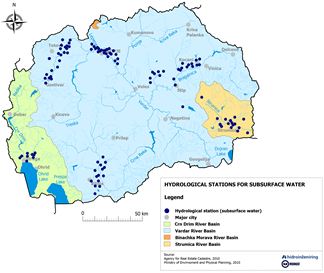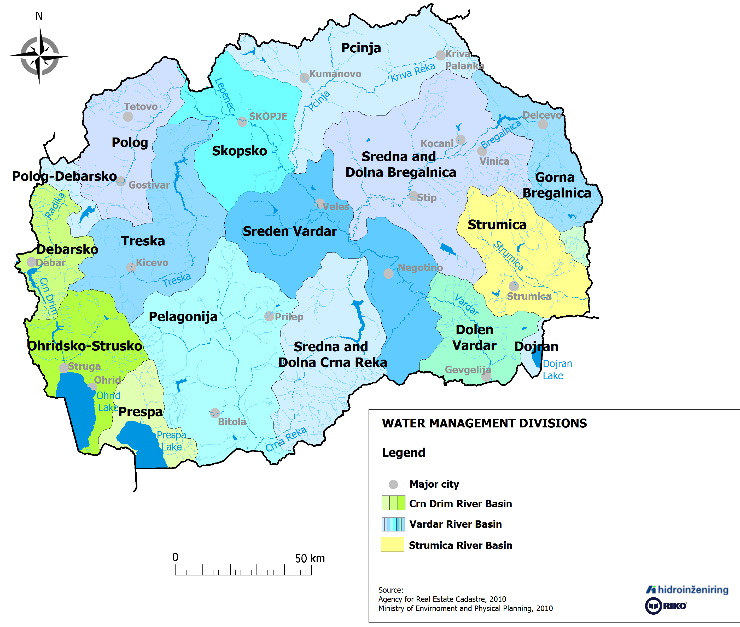PROJECT TITLE: Development of national water study
Overall Objective
To protect the environment from the adverse effect of urban wastewater through its collection and treatment prior to discharge, ensure provision of safe drinking water and increase water management capacity.
Purpose
Development a National Water Study as a package of instruments for future development of sustainable water investment projects in order to implement requirements of the Urban Waste Water Treatment Directive and Drinking Water Directive.
 At the moment country faces poor coordination between the competent authorities to hamper implementation of the water legislation and preparation of infrastructure investment is lagging behind. Water sector has many cross-cutting policy frameworks and relies on good cooperation and coordination of different institutions with in many instances distinctly opposing views.
At the moment country faces poor coordination between the competent authorities to hamper implementation of the water legislation and preparation of infrastructure investment is lagging behind. Water sector has many cross-cutting policy frameworks and relies on good cooperation and coordination of different institutions with in many instances distinctly opposing views.
To meet EU requirements there is a very large investment needed. Country must be in a position to absorb and efficiently implement capital intensive infrastructure projects with EU assistance. At the moment, capacity for preparing and implementing this large investment is weak. The EU recognises that environmental projects are important capital intensive and the lack of progress in the implementation of the water legislation is of concern.
Due to this reason, this project has been initiated under IPA, as a support in investment planning process and for strengthening capacities of relevant institutions for being able to both implement and sustain the investments needed for EU compliance in water sector.
At present, covering investment costs is a very substantial challenge for national and local level authorities, and the available national and funds have to be planned strategically. Also, the continuing burden of operating and maintaining the wastewater collection and treatment systems will not be subject to external support and the PUCs will need to be able to generate revenue to cover these costs. In that direction, Government supported by EU, undertook some actions for setting up an appropriate system for water pricing, by adopting new Law on setting of water service prices, and graduate introduction of “polluter pay” principle.
Project will develop Directive (Specific) Implementation Plans as documents which support the negotiation position of the country. These plans will identify missing infrastructure, develop list of investment projects, identify measures and assess their costs, foresee sources of financing and assess realistic implementation timetables. Such plans will not only provide a basis for negotiation process of the country in regards to Chapter 27- Environment and climate change, but will also guide investment management and the priority setting process in the country. Thus, these documents shall be used during the process of implementation of legislation, as well when defining measures to be included in different donor supported projects.
The project is National in scope. It is multi angle process that requires close cooperation and teamwork among number of stakeholders, responsible institutions, but also departments/units within different Ministries.

Country acquired Candidate Country status in 2005 and on 18th February 2008 the European Council adopted the Accession Partnership.
The alignment of national legislation with EU requirements is carried out in accordance with the National Programme for Adoption of the Acquis (NPAA), and in the area of environment, in line with the National Environmental Action Plan (NEAP).
The water sector faces considerable challenges in the coming years:
- Meeting the EU requirements for wastewater collection and treatment and achieving full compliance with the Drinking Water Directive (DWD),
- The increasing costs of replacing aging infrastructure – a capital maintenance backlog has arisen due to a lengthy period of very low investment in asset replacement
- Maintaining tariffs at an affordable level during a period of low economic growth
- Institutional and organizational reform, professionalization and achievement of economies of scale.
Institutional aspects
The obligations for compliance with the water related directives are capital intensive and for waste water collection and treatment alone are estimated at around 700 million Euros. (COWI 2010). The implementation of such a capital intensive programme puts stress on the financial capacity of the country and the local beneficiaries. However, equally the management of the programme puts pressure on the institutions which are responsible for its implementation. This, paired with the limited capacities in the relevant institutions, requires:
- Cost effectiveness in all phases of implementation of the programme;
- Clear institutional responsibilities avoiding overlaps;
- Transparent methods for cooperation and coordination;
- Involvement of stakeholders early in and throughout the process;
- Strengthening of the administrative capacity and staff capabilities.
| Activity 1 | Assessment of the administrative/organisational set up and situation regarding cooperation and coordination between competent authorities and stakeholders; development of an Institutional Development Plan with proposed organisational structure, lines of communication staffing etc. and a Stakeholder Involvement Plan to ensure successful implementation of the requirements of the UWWTD and DW Directives. |
| Activity 2 | Collect, review and organise the available information regarding water resources quantity and quality; assess current and future water demands and develop a water balance taking into account climate change impacts; assess impacts on water quality particularly due to disposal of urban waste water. Identify measures (legal, environmental, technical and economical) and propose and institutional system with the aim of higher efficiency in water use and protection of water against pollution. |
| Activity 3 | Develop methodology and define Sensitive Areas. Develop criteria/methodology and identify Agglomerations; collect/develop required data to assess compliance gap. Identify water supply zones; collect/develop data to assess compliance gaps and compliance with national policies. Develop IT solution and GIS tools. |
| Activity 4 | (This activity directly interlinks with Activity 3) Identification of investment needs for compliance with the Directives. Prioritize projects and develop a project pipeline taking into consideration financial, planning and capacity constraints resulting in National Programme for Investments in 1) Waste Water sector and 2) Drinking Water sector. |
| Activity 5 | Assess current sludge production and management. Assess the time related development of sludge generation and potential impact of contaminants on sludge quality. Development and assess sludge management options, taking into account limitations from the Sludge Directive and national policies. For the preferred option determine CAPEX/OPEX, financing mechanisms. Develop short term interim solutions for short sludge management. |
| Activity 6 | (The activity directly interlinks with Activities 3 and 4) Develop project pipeline, (projects, costs, planning) and specify a 3 year budget plan, 6 years action plan and a 12 years programme. |
| Activity 7 | Assess institutional capabilities and the capacities for management of the investment programme (central/local), procedures and current practice. Develop Capacity/Capability Building Programme (short -during project- /medium). Develop Manual for project management for municipalities. |













Follow us & Share